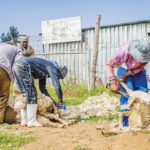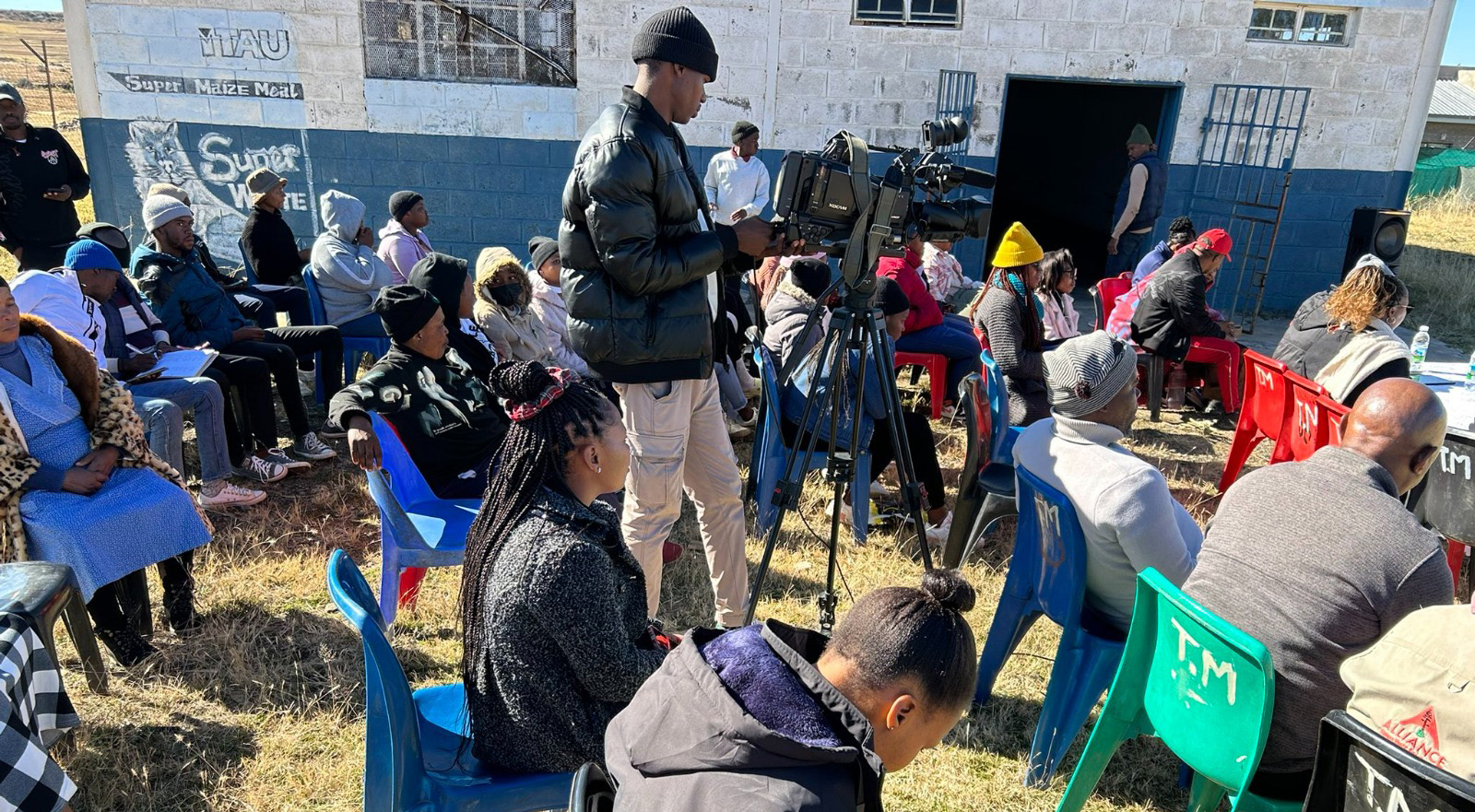The bane of informal stock pounds

SHARE THIS PAGE!
By Staff Reporter
“Don’t mix the short one with the long one, be careful,” shouts an unidentified man holding a pair of scissors.
He is cautioning a colleague about the chunks of fleece lying on the ground after he had just completed shearing a sheep in about 30 minutes near a shack at Ha Matala, about 3km south of the Maseru city along the Main South I Road.
It is at this spot where a number of men, most of them hailing from the highlands, have bunched to establish an informal and unregulated small stock market. They do not know who owns the land they are occupying, and it does not bother them one bit.
The animals are sold to any customers for a variety of purposes such as slaughtering for traditional rites, butcheries and hosting of feasts.
Other than that, the fleece from the sheep is sold to individual buyers who then sell to the shearing sheds in various parts of the country.
The men are part of a group of small stock traders that have established informal businesses in shacks at Ha Matala and Lithabaneng, also in Maseru.
But such trading conducted in makeshift informal and uncontrolled pounds is regarded as illegal as it is not mandated and regulated by the laws governing sale and buying of livestock, especially in the areas under the control of the Maseru City Council (MCC).
These trading spots which are situated in the urban areas, have not been duly earmarked by the council for such activities.
One of the farmers doing business there, Lebohang Mahula, who hails from Marakabei in rural Maseru, says the prices of sheep range from M800 to M1 400.
“That depends on the age, size and the quality of the animal. We also sell fleece to private buyers who weigh the fibre and determine prices themselves. I believe these private fleece buyers sell the product at sheds,” said Mahula, who is ignorant about mohair quality and sales.
The only proof of ownership of the animals he has are a letter from his chief back home, and the special ear marks on the sheep.
“I just came here and sought permission from one of the sellers who was already doing business here. We usually request beg land owners to graze on their unused land. I do not think this shortage of animal feeds affects the quality of the meat,” he added.
As a precaution against theft, the animals are some of the residents’ temporary enclosures overnight, and the farmers pay a rental fee of M100 a month.
“We look for households which have kraals or are fenced. We have heard stories of animals being stolen in some residences,” he recounted before completing a transaction with a butcher went on to purchase 15 sheep at M1 300 each.
According to the assistant marketing officer of the department of marketing in the ministry of agricultural and food security, Phole Keketsi, the livestock owners are haphazardly pick spots to use as marketplaces to sell their animals.
Referring to Ha Matala and Lithabanneg, Keketsi stated: “These (places) are not favourable and suitable for sale of these animals. Such places (Matala and Lithabaneng) are under the jurisdiction of the city council. These spots are close to the main road, residences and people’s yards.”
The city council should issue certificates paving way for choice of site for sale of the stock at those areas.
Keketsi said at one stage the Mejametalana agric centre at Lithabaneng village, was initially bandied as a possible spot to set up a livestock market, but it was dropped because of its overly close proximity to humans and their properties.
The dismissal of Mejametalana was followed by a look-in at Maqalika, near the Lesotho Agricultural College, but the idea came to pass.
“The suitability of the place as a marketplace was evaluated, but it was deemed to be too close to the dam which is controlled by the Water and Sewerage Authority (now WASCO). Keeping a large number of animals there would contaminate the water which is used for human consumption. Also, transporting or driving livestock from enclosures at Lithabaneng and Matala to Maqalika would cause undue disruptions to road traffic flow.
The common denominator in all these proposals was the concern over the environmental impact and health risks that could be posed by animal waste, among others.
The feedlot and abattoir 10km north of Maseru would have been the ideal place to keep and sell livestock. However, plans to that effect were scuppered by a protracted court battle over the ownership of the facility.
“The quality of meat from the livestock is also compromised by lack of proper feeding. Not only that but the fibre these people sell to individual private buyers, is not classified, and there is a likelihood of the owners being shortchanged.
Keketsi’s sentiments were echoed by the livestock department’s chief animal production officer, Molefe Petlane, who warned: “These places where such animals are sold, are not farms. There are negative environmental hazards as a result. Again, the animals lose weight due to lack of proper feeding.”
The Animal Health, Production and Welfare Bill is now under scrutiny by the ministry before it is debated by parliament and enacted as law.
Its aim is to provide protection and promotion of health of animals, make provision for control of animal diseases, provision of veterinary services and promote animal welfare.
The sale of livestock in this fashion should meet certain prescribed requirements, according to the Agricultural Marketing (Trading) Regulations of 1974.
The regulations require that a trader should fill an application form for sale, be in possession of a letter from a local chief, have a national identity card or passport MCC or urban council permit, a certificate from the district public health office, a sub-lease agreement if the place of sale is rented, recommendation from the district marketing office and an approval from the market access section.
While the stock owners continue to sell their animals in these unauthorized areas, the ministry of agriculture is cracking its head in search for a better and suitable place.
Approached to comment on the unregulated business of livestock selling, MCC pounds master John Ramane, said he was on leave, and would require clearance to speak to the media from MCC public relations officer ‘Makatleho Mosala. The latter said she would only be available for comment next week as she was ‘away from the office’.
Mosala added a that she, not Ramane, was the one authorised to provide a comment.

Communities empowered to protect environment
10 days ago
Alliance boosts MCC fleet
11 days ago
Young people discuss economic future at Taung
12 days ago
CityzeenLs nears 1 million YouTube views
12 days ago
Econet commits over M1million to Lecholi event
12 days ago

New border plan to advance regional trade
15 days ago
Foul language lands man in court
15 days ago
Youth demand action on unemployment
15 days ago
Ex-ministers threaten to sue govt
15 days ago